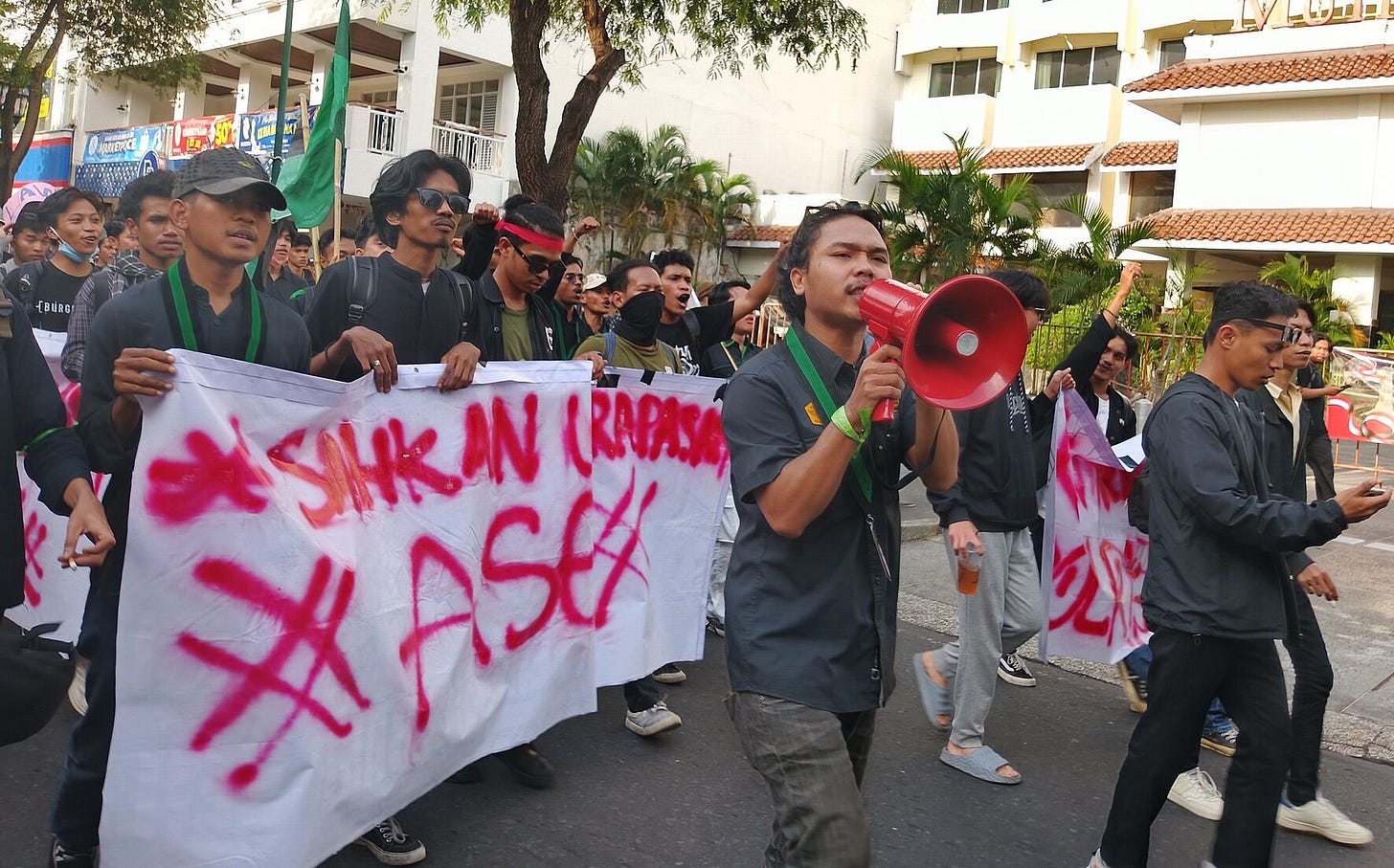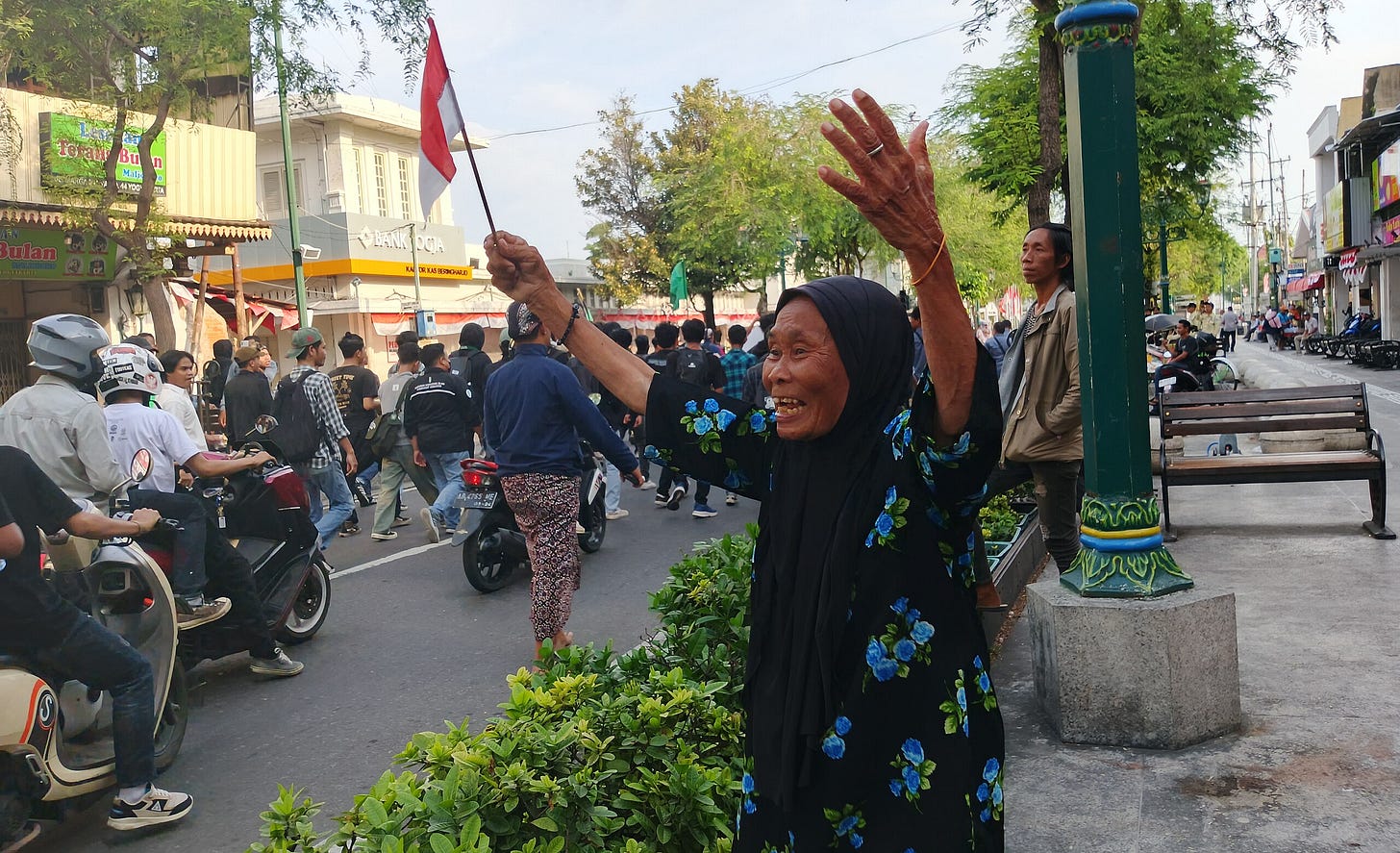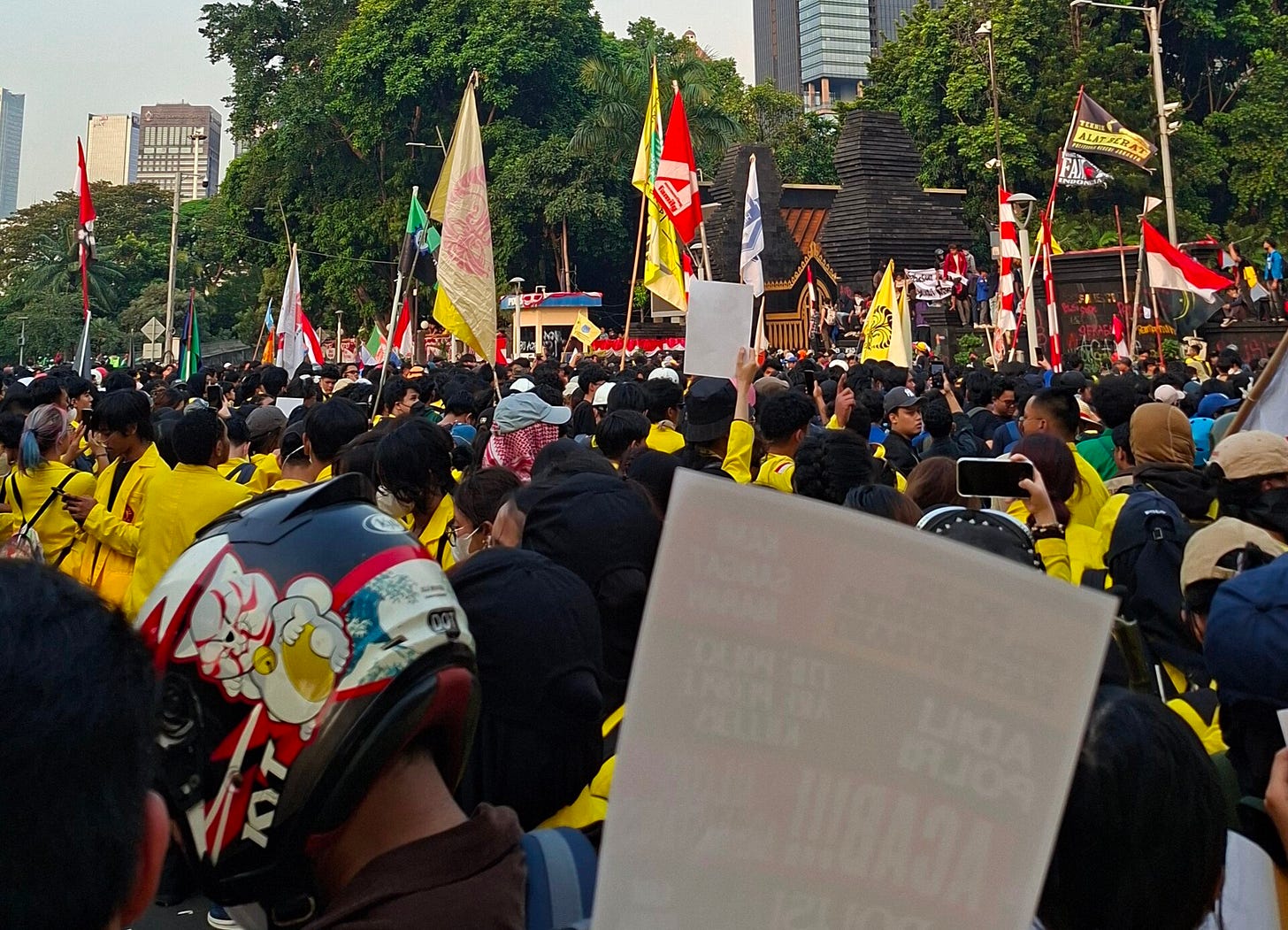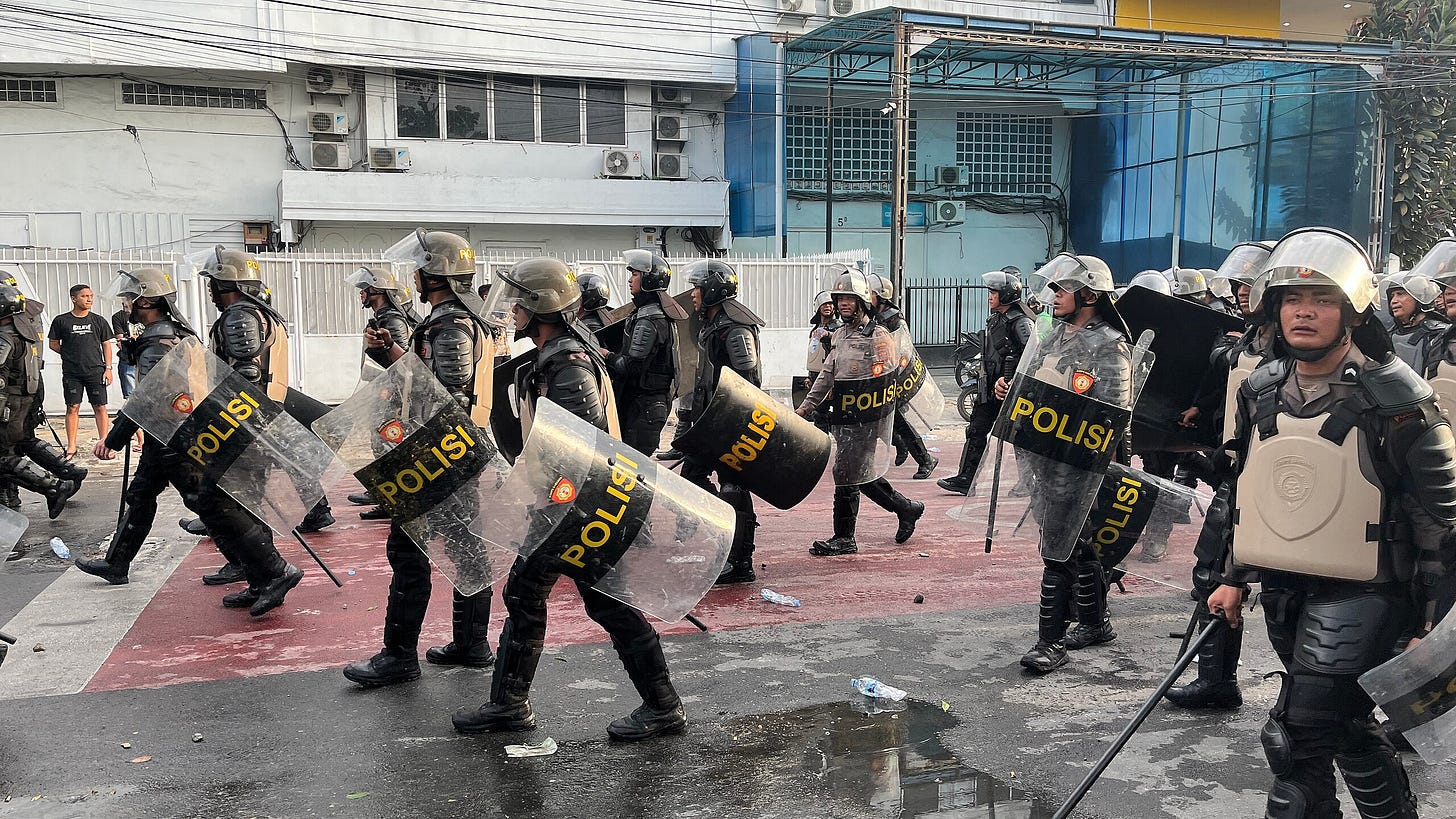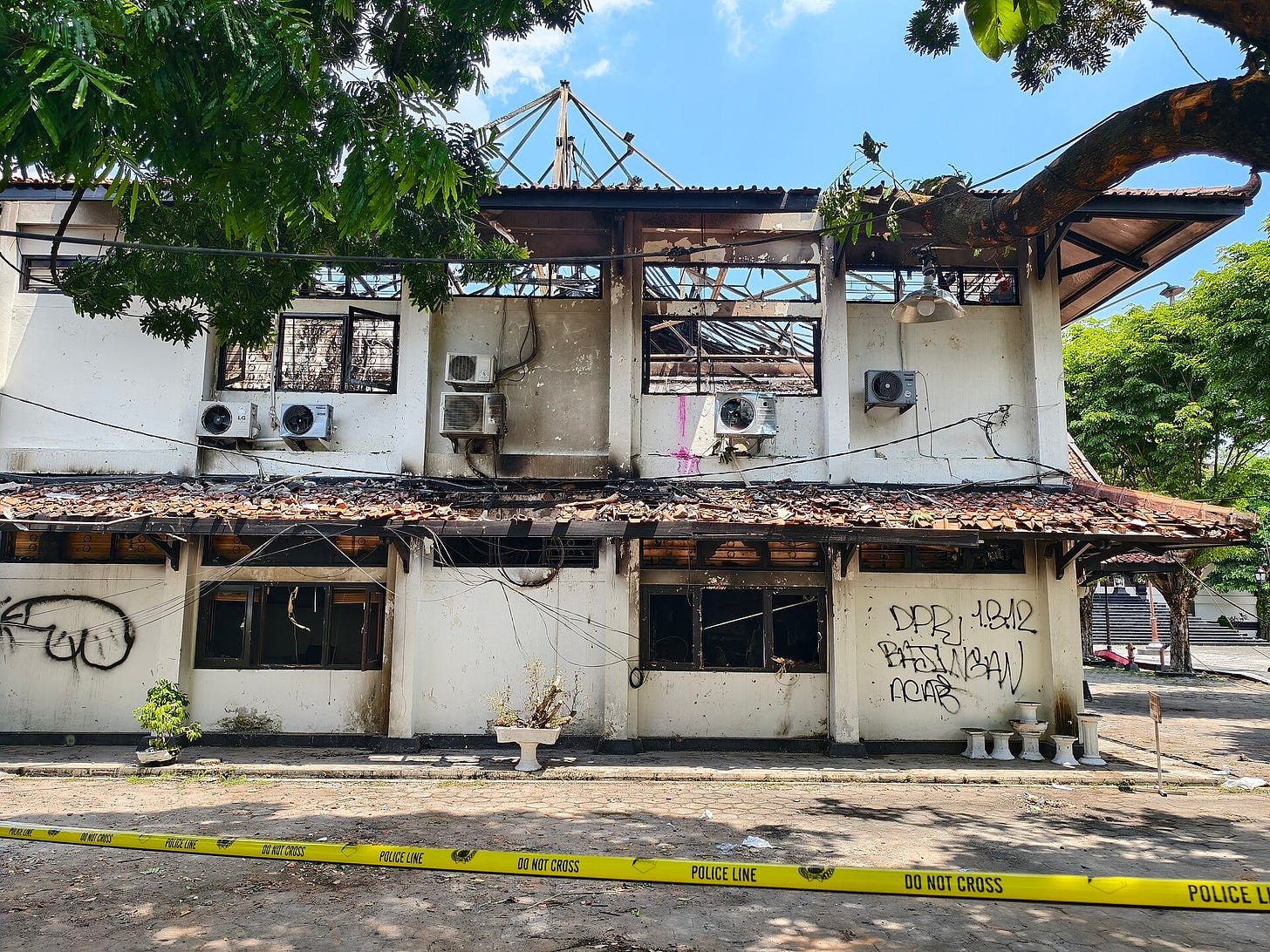For around seven months, protests have been spreading across Indonesia — but in the last few weeks, they’ve intensified.
Massive demonstrations broke out outside of Indonesia’s parliament on August 25, triggered by public anger over what many see as vastly overinflated salaries for politicians. At a time of widespread economic hardship, protesters were further outraged by newly proposed housing allowances for parliamentarians.
“The protesters are basically demanding better livelihood, because they’re facing tax increases,” says Andreas Harsono, an Indonesia researcher for Human Rights Watch. “Meanwhile they’re seeing many high-ranking officials, lawmakers, having increased perks or salaries. That’s why they feel like it is unfair. They perceive that corruption is widespread.”
“What the protestors demand fundamentally is asking for a reform of political parties […] There is a disconnect between legislators and voters.”
But on August 28, things turned deadly after a police armoured car rammed into demonstrators in the capital Jakarta, killing 21-year-old Gojek motorbike driver Affan Kurniawan, after he was caught under the vehicle’s wheels. Videos of the police incident quickly circulated online, and the previously mostly peaceful protests began escalating into violence.
“Because of that video the image of police brutality is being enhanced. Attacks against the police have increased dramatically,” says Andreas.
Since then, protesters have clashed with the police across the country, with numerous buildings — including historic ones, such as the Gedung Negara Grahadi, an iconic late 18th-century construction which stood as the official residence of the governor of East Java — being burned down. The military has been deployed as a means to deal with what is becoming a national crisis, and numerous civil activist groups are rallying against the state.
“The situation right now […] it is scary, it’s very tense,” says Andreas. As of publication, at least 11 people have died in the protests, with dozens more injured and over 1,000 arrested — many of them high school students.
Wealth Inequality in a Uncertain Economy
The cost of living is rising around the world, and Indonesia is no different. Financial pressures have fed into growing anger over politicians’ pay and allowances; in turn, there’s a palpable sense of animosity and anger being directed towards the ruling classes. “58% of certified land titles are only owned by, more or less, 60 families in Indonesia. That is really injustice,” Andreas adds.
Politicians’ pay far exceeds the minimum wage in Indonesia. The salaries of lawmakers have now risen to more than 10 times the minimum wage of the capital Jakarta, already seen as high against the national average. At the same time, economic stagnation and lack of job opportunities have seen thousands of Indonesians working as drivers for ride-sharing apps just to make ends meet.
In effect, Affan — who was making a food delivery at the time of his death at the hands of the authorities — came to symbolise the broader struggles for many in Indonesia: gig economy workers often surviving on paltry wages, being rolled over by the state (in this case, quite literally).
“[It’s] reflective of what happened to many middle class Indonesians,” says Andreas. “They are angry — they’re very angry.”
During this time, the government under President Prabowo Subianto has been scrambling — albeit unsuccessfully — to quell the unrest. In late August, Prabowo cancelled a trip to China to commemorate the anniversary of the end of World War II, after which he released a televised statement to the nation. In it, he described police’s actions as “excessive”, expressed sympathy with Affan’s family and called for calm (he would later meet with Affan’s parents to offer his condolences in person).
Around the same time, the police publicly apologised to the nation, with the officer who drove the vehicle that killed Affan being found guilty of violating police ethical standards and demoted for seven years (though escaping dismissal or prison).
Following a list of demands issued by protest organisers, the Prabowo government has announced that a number of lawmaker privileges — including the controversial housing allowance — will be revoked. But while public apologies and promises of mild reform may have slightly eased tensions, they’ve also been met with scepticism. Protest leaders have dismissed the president’s previous statements as hollow platitudes. Now it comes down to whether the government is willing to not just talk the talk, but walk the walk — and if it isn’t, how badly things might flare up again.
“We are facing a complicated situation now,” says Andreas. “On one side, people perceive the police is doing an excessive use of force: beating protestors, detaining onlookers, more than 1,000 being arrested. On the other side, [some protesters are expressing] their anger by committing violence.”
‘Have a dialogue! Talk to the people’
For this episode of Currents, I speak with Andreas about what’s going on in Indonesia, and where he thinks this might lead. Though providing valuable insights, he’s also quick to note that the ongoing chaos and uncertainty is making any accurate assessment almost impossible at the current time: “The situation is still very fluid. Things are still going on […] we do not know what is happening, even yesterday.”
But Andreas points out that there are clear steps the authorities should take. “The police should [either] charge those detained with credible indictments, [or] if not they should be released immediately.”
But more than anything, as Andreas says, the authorities need to listen to the people on the ground. “I really hope that the government, the police, the military, could have a dialogue with civil society organisations, with the student leaders.”
“Have a dialogue! Talk to the people — talk to the people,” he adds.
For More Information
If you are looking for more independent coverage of the situation, Tempo, the weekly Indonesian magazine, also publishes in English.
I also recommend listening to Reformasi Dispatch with Erin Cook and Kevin O’Rourke, which covers Indonesian politics, policymaking, justice and economics, while Taiwan-based publication New Bloom recently released an interview with Iftitah Sari, a researcher at the Institute for Criminal Justice Reform in Jakarta, to discuss the ongoing situation.
People from around the region have also been using local delivery services like Grab and Gojek to order food for delivery riders in Indonesia, so if you have access to these apps, it’s one way to show solidarity and support.




